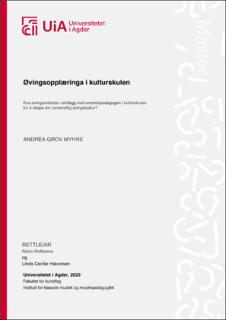| dc.description.abstract | Samandrag
I denne masteroppgåva tek eg føre meg øvingsopplæringa i kulturskulen og kva øvingsmetodar musikklæraren i kulturskulen vektlegg for å skapa ein berekraftig øvingskultur. For å samla inn data til oppgåva har eg gjennomført tre intervju med instrumentalpedagogar i kulturskulen, samt gjennomført fire observasjonar av undervisning. I intervjua har eg fått innsyn i pedagogane sine tankar og refleksjonar om øving og kva dei vektlegg i prosessen med å læra elevane å øva. I observasjonane har eg sett på korleis øvingsopplæringa fungerer i praksis. I oppgåva ser eg på korleis det vert jobba med ulike øvingsmetodar og øvingsrutinar. Vidare ser oppgåva på korleis motivasjon og ferdigheitsnivå spelar inn på øvinga.
Oppgåva tar for seg teori om øving og øvingsmodellar der det blir sett på kva øving inneber for ein musikar. Det blir også sett på musikkpedagogikken som fag og instrumentalpedagogen sin profesjon. Det blir samt sett på læringsteori der det er tatt utgangspunkt i John Dewey sin teori om læring gjennom erfaring og refleksjon. Sidan kulturskulen er ein sentral del av oppgåva er det sett på rammeplanen for kulturskulen. Her er det fokus på kjerneprogrammet for musikk. I anna forsking er det tatt med internasjonal forsking om øving, motivasjon og utvikling av ferdigheit.
I drøftinga ser eg på dei ulike øvingsmetodane som er komen fram i intervjua og observasjonane, og korleis desse samsvarar med teori og anna forsking. Vidare ser eg på korleis dette blir overført til eleven si eiga øving. Motivasjon blir drøfta som ein indre og ytre faktor og det blir sett på korleis øvingsmetodar kan vera ein motivasjonsfaktor. Til slutt er det sett på korleis ferdigheitsnivået til eleven spelar inn på korleis ein brukar øvingsmetodar og evna til løysa problem som oppstår i øvingssituasjonen.
Funna frå forskinga mi visar at det i stor grad er dei same øvingsmetodane som går igjen hos fleire lærarar. Ein ser og at dei same øvingsmetodane blir brukt uavhengig av eleven sitt ferdigheitsnivå, men at ein må ha variasjonar i øvinga som er tilpassa motivasjonen og ferdigheitsnivået til den einskilde eleven.
Abstract
In this master's thesis, I address the routines of practicing in music education in public schools of art. I explore the teaching methods emphasized by instructors to create a sustainable culture of practice among students. To gather data for the thesis, I’ve conducted three interviews with musical instrument teachers and carried out four observations of their teaching. Through the interviews, I gained insights to the teachers' thoughts and reflections on practicing, as well as what they emphasize in the process of teaching students how to practice by themselves. The observations gave me a practical understanding of how instructions of practice are incorporated in the teaching process.
The thesis examines how various practice methods and routines are employed and how motivation and skill level of the students’ impact on their practice. It delves into the theory of practice and practice models, exploring what practice entails for a musician. Additionally, it considers music pedagogy as a discipline and the role of instrumental pedagogy as a profession. The study also draws on learning theory, particularly John Dewey's theory of learning through experience and reflection. Given the central role of the schools of art in the thesis, the curriculum for cultural schools is examined, with a focus on the core music program.
Incorporating international research on practice, motivation and skill development, the thesis discusses the various practice methods identified in the interviews and observations, examining how they align with theoretical frameworks and existing research. Motivation is explored as both an internal and external factor, and the role of practice methods as motivational factors is considered. Finally, the thesis investigates how the student's skill level influences the choice of practice methods and the ability to solve problems encountered during practice.
The findings from my research indicate a significant overlap in the practice methods employed by the teachers in the study. It is observed that similar practice methods are used across various skill levels, and how adjustments in practice approaches are necessary based on each student’s individual motivation and skill level. | |
